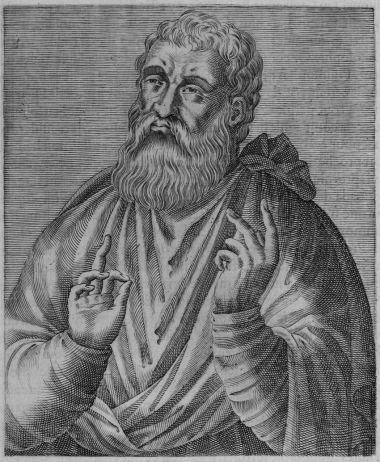Who was Justin Martyr? The second-century saint tortured and beheaded for his faith

It's the feast day of Justin Martyr (100-165), one of the earliest of the Early Church fathers and one of the most important. He did crucial work in defending the faith against its attackers and developed some fascinating ideas about how ancient philosophers like Plato and Aristotle anticipated Christianity. Here are 10 things about him you might not know.
1. He was born in Nablus in modern-day Palestine, but he was a Roman. He was fascinated by philosophy from an early age and studied in the famous libraries of Alexandria and Ephesus.
2. Philosophers, unlike clergy, wore distinguishing cloaks. One day when Justin was walking along the seashore an elderly man engaged him in conversation about Judaism and its promised Messiah, who he said had already come. Justin had never read the Hebrew scriptures before and eagerly perused them. Through reading the scriptures and seeing Christians die in the arena as martyrs he was converted.
3. Justin did not take off his philosopher's cloak after he was baptised. He believed that only after be became a Christian was he qualified to wear it, as Christ was the key who unlocked all the doors of pagan knowledge.
4. He went to Rome and gave public lectures about the faith at a time when it was very dangerous to do so. He also wrote two defences of Christianity, addressed to the Emperor and the Senate, answering charges that Christians were atheists who practised incest and cannibalism.
5. He was very critical of the pagan morality of his day, which was marked by adultery, promiscuity and paedophilia. He condemned homosexual practice, prostitution and abortion, and said Christian living was marked by purity.
6. He also condemned the idea that there were no moral absolutes, saying that the "greatest impiety and wickness" was the idea that "there is no real virtue or vice but only by opinion are things considered good or bad".
7. A very learned man, he found lots of parallels to Christianity in the writings of pagans. He argued that this was because Christ, the 'Logos' or Word of God, was responsible for the creation of the world and had left traces of himself everywhere. But pagan wisdom was to be judged against the yardstick of Christ.
8. In rebutting pagan charges of cannibalism – provoked by the language of Communion about eating flesh and drinking blood – Justin offers the earliest account of Christian worship we have. He writes about baptism, communion, preaching and even the offering.
9. Justin's Second Apology (or defence) is addressed to a philospher named Crescens. Crescens reported him to the prefect of Rome, Rusticus, who had him arrested.
10. What may be an accurate account of the trial survives. Rusticus presses Justin on whether he believes he will go to heaven when he dies. "I don't think it, I know it," says Justin. "I have no doubt about it whatever." He orders Justin to sacrifice to the gods, to which Justin says: "No one in his senses gives up truth for falsehood." Rusticus threatens him with torture. "We ask nothing better than to suffer for the name of our Lord Jesus Christ and so to be saved," says Justin.
Together with others, he was scourged and beheaded.
Justin's life and works represent early Christianity struggling with intellectual challenges and political oppression. He was a profound thinker and a courageous Christian who was faithful unto death.
For more about the early Christian saints and martyrs see Who Were the Church Fathers? by Marcello D'Ambrosio.
Follow Mark Woods on Twitter: @RevMarkWoods











